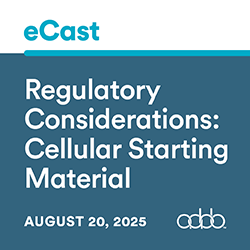

Product Code: 25EL-565-4035
Please note: This is a Single Viewer registration for one participant for the on-demand version of this program. Access instructions for the on-demand version of this program will be provided via email approximately 3-10 business days after the live program has occurred and the on-demand version is available. If registering after the on-demand version is available, immediate access is granted via the AABB Education Platform at https://education.aabb.org.
If you registered for the live program you do not need to register for this on-demand eCast (access to the on-demand eCast was included with the live program registration).
If you are interested in presenting this program to a group, please see the “eCast Registration Form– Group Viewing” form on the program page.
Program Description: For more than 60 years, cell therapies have focused on autologous treatments derived from a patient’s own cells, including the current FDA-approved cell-based therapies. FDA regulations and accreditation standards in cell therapy were developed predominantly around the collection, manufacture, and infusion of therapies derived from patient cells and tissues. However, there are now over 100 companies developing allogeneic therapies derived from the cells of healthy donors, with over 500 clinical trials underway. This indicates a significant shift toward off-the-shelf therapies where the cellular starting material (CSM) is collected from healthy donors and manufactured into a therapy for dozens of patients. Organizations collecting blood-derived CSM from healthy donors for use in the manufacture of CAR T therapies are unsure as to whether they should be following regulations and standards for donor-derived blood products or patient-derived tissue products. Recent draft guidance from the FDA for CAR T therapy manufacture has created additional confusion as to whether the blood-derived CSM should be treated like a blood product or tissue product. Both collectors of CSM and developers of allogeneic cell therapies are seeking more consistent guidance and understanding from the FDA and accrediting bodies on the requirements of donor-derived CSM that feed into the manufacture of clinical products. Should healthy donors be qualified and tested based on blood product or tissue product regulations? How should the blood products be handled and processed, stored and shipped if being used in CAR T therapy manufacture? Collection of CSM is the first step in manufacturing, so these questions need more consistent answers to create the most applicable regulatory standards for this exploding allogeneic cell therapy industry. In this eCAST, faculty will review the different types of CSM and their therapeutic applications. They will discuss the FDA’s definition of blood products and tissue products, then dive deep into the current state of the FDA regulations for these products and draft guidance issued for CAR T therapy developers that relates to the collection of CSM from healthy donors. Through participation in this eCAST, the faculty hope you leave with a better understanding of how to apply the existing and future regulatory framework to the collection and use of donor-derived CSM for allogeneic cell-based treatments.